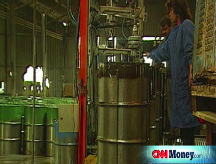Europe may push the Fed to raise rates
The European Central Bank is expected to boost a key rate Thursday in order to fight inflation. The move may cause a weaker dollar and force the Fed's hand.


NEW YORK (CNNMoney.com) -- The fireworks may come a day early for the financial markets if the European Central Bank, as expected, raises interest rates on Thursday.
If the ECB, Europe's counterpart to the Federal Reserve, hikes rates, that could put even further pressure on the anemic dollar and send commodity prices even higher.
The ECB will announce its decision on interest rates early the morning of July 3 and will hold a press conference shortly thereafter to discuss the decision.
Members of the ECB, most notably its president Jean-Claude Trichet, have been talking loudly about inflation concerns in recent weeks and have hinted that a rate hike will take place at Thursday's meeting.
If the ECB does raise rates by a quarter-of-a-percentage point, that would leave its benchmark short-term rate at 4.25%. By way of comparison, the Fed's federal funds rate is just 2%.
The disparity between interest rates in Europe and the U.S. is one key reason why the dollar has weakened as much as it has in recent months.
The federal funds rate was at 5.25% last September before the Fed began slashing interest rates. Meanwhile, the ECB has held pat. (The last time ECB changed rates was with a quarter-point rate hike in June 2007)
Since the Fed started cutting rates, the dollar has fallen 12% against the euro. And the dollar's slide has contributed to the surge in commodity prices, particularly oil. Crude prices are up 74%.
Considering that the Fed left rates unchanged last week, a rate hike by the ECB may only make matters worse for the dollar in the short-term and lead to even higher oil prices. That would be more bad news for an economy and stock market that's struggling to grapple with rising energy prices.
"Investors are going to be looking very closely to see what happens with the ECB. The change in the dollar has meant almost as much to a lot of stocks as their fundamentals lately," said Jason Tyler, senior vice president of the investment committee for Ariel Investments, a money management firm based in Chicago.
"The ECB's decision is exceptionally important right now because the impact on commodity prices has been driven by the weakness of the dollar," Tyler added.
But just like with the Fed, investors will also be paying close attention to what the ECB says in addition to what it does. If Trichet indicates that the ECB may raise rates again in the next few months, that could really spook Wall Street.
"The ECB has not suggested that it is starting a program to raise rates on an ongoing basis. It seems like this rate hike is one and done," said Bill Knapp, investment strategist with MainStay Investments in New York.
"But if Trichet were to indicate that the ECB is not finished raising rates, it would hit the dollar and cause commodities to rise even more," he added.
And if that happens, the Fed's worst fear could be realized. A weak dollar causes more inflation pressure, which leads to an even weaker dollar. It's a phenomenon that Dallas Fed president Richard Fisher referred to in a speech last month as a "negative feedback loop."
Simply put, the Fed can't ignore the impact that low rates in the United States are having on the dollar. And even though the central bank still has to be concerned about the credit crunch and housing crisis, the risk of economic conditions getting even worse grows every time oil and gas prices hit a new high.
"It's an amazingly tough balancing act right now for the Fed. It is trying to juggle keeping rates low to spur the economy while doing what it can to keep the dollar competitive against the euro," Tyler said.
The Fed's Fisher, it's worth noting, is the only member of the central bank's policy-making committee who voted last week for a rate hike. But if the ECB continues to talk tough about inflation Thursday, Fisher may find some colleagues joining him in calling for a rate increase`, possibly at the Fed's next meeting on Aug. 5.
"The Fed should have done a surprise preemptive rate hike at its last meeting," Knapp said. "Maybe the ECB will try and nudge the Fed in the direction of joining the inflation fight."
Issue #1 - America's Money: All this week at noon ET, CNN explains how the weakening economy affects you. Full coverage.
Gas prices have climbed to record levels. Are you feeling the pinch? Tell us how gas prices are affecting you and what you're doing to cope. Send us your photos and videos, or email us and tell us what you think. ![]()



